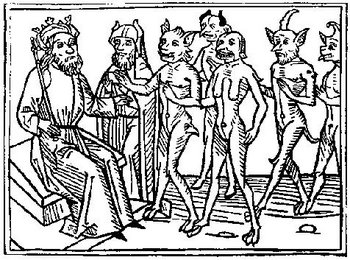|
Consolatio Peccatorum, Seu Processus Luciferi Contra Jesum Christum
''Consolatio peccatorum, seu Processus Luciferi contra Jesum Christum'' is a Tract (literature), tract written by Jacobus de Teramo in around 1382. It discusses a lawsuit between Lucifer and Jesus Christ, Solomon presiding, in which the Devil is suing Christ for having trespassed by Harrowing of Hell, descending into Hell.This work was printed repeatedly and translated into several languages. Description In fact "''Consolatio peccatorum''", describes not one, but two trials between :simple:Lucifer, Lucifer and :simple:Jesus, Jesus Christ, before a tribunal presided over by :simple:Solomon, Solomon, in which the devil pursues Christ for having committed an intrusion into his domain during his :simple:Harrowing_of_Hell, descent into Hell. At the first trial Moses is counsel for Jesus Christ and Belial for the Devil. At the second trial the Joseph (Hebrew Bible), Patriarch Joseph is judge, Aristotle and Isaiah defend Jesus Christ, and the Emperor Augustus and Jeremiah defend the De ... [...More Info...] [...Related Items...] OR: [Wikipedia] [Google] [Baidu] |
Belial
Belial ( he, , ''Bəlīyyaʿal'') is a term occurring in the Hebrew Bible/ Old Testament which later became personified as the devilSee the reference to "Beliar" in ''The Ascension of Isaiah'', at EarlyChristianWritings.com', specifically at 1:8–9, 2:4, 3:11–13, 4:2, 4:14–18, 5:1, 5:15. in Christian texts of the New Testament. Alternate spellings include Baalial, Balial, Belhor, Beliall, Beliar, Berial, Bylyl and Beliya'al. In the Secret Book of John, an early Gnostic text, the ruler of the underworld is referred to as Belias. Hebrew Bible/Old Testament ''Belial'' is a Hebrew word "used to characterize the wicked or worthless". The etymology of the word is often understood as "lacking worth", from two common words: ''beli-'' (בְּלִי "without-") and ''ya'al'' (יָעַל "to be of value"). Some scholars translate it from Hebrew as "worthless" (''Beli yo'il''), while others translate it as "yokeless" (''Beli ol''), "may he have no rising" or "never to rise" (''Beli ... [...More Info...] [...Related Items...] OR: [Wikipedia] [Google] [Baidu] |
